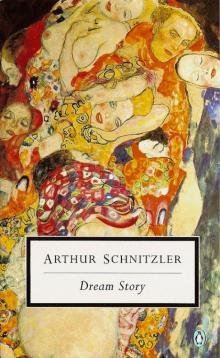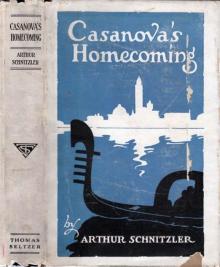- Home
- Arthur Schnitzler
Late Fame Page 6
Late Fame Read online
Page 6
Lights were also appearing on the distant railway bridge, with an intensely red one right in the middle. He didn’t understand why he was watching all this so attentively, but he couldn’t turn away. It was impossible for him to settle to quiet contemplation . . . it was as if the few poor thoughts he had already caught were fluttering off again. Only one dead, incomprehensible word remained and buzzed in his head . . . evening . . . evening . . .
Now the bells sounded from their towers; three or four rang out at once. They seemed to make such a loud noise that all other sounds were swallowed up by it.
It was dark and the old gentleman decided to turn around. He walked quite rapidly. He had a yearning for the bright, inhabited streets. He knew now: his efforts were in vain. Laughable was what they had been. It was over. At heart it was simple and not even very sad—no sadder than age itself, hardly sadder than the thirty years in which no verse had ever occurred to him.
But that wasn’t even the crux of it. He also knew that everything would have been different if his outer life had turned out differently, if the public had taken notice of him then. There was no doubt that that would still have had some significance for how he himself had turned out; back then, it would not have been merely a pleasure, it would have been a stimulus—the soil had been fresh and moist . . .
Now his soul was . . . a dry, frozen clod . . . he couldn’t help but smile: he was thinking in images, as if he really were a venerable poet . . .
He had got back to the Ring and all the clamor of the city was again about him. He was not really in the mood to go to the coffee house, today he just wanted to go home for once, sit himself down comfortably in his easy chair, read something, something very light, and not go back out onto the street. To his surprise, he was hardly discountenanced. Indeed, he was pleased that he definitely did not have to write anything. The idea of doing so had made him uneasy from the start—now he had been excused it and he was almost happy.
When he arrived home, he found a letter that a porter had brought over. The handwriting on the envelope was not familiar. He opened it. The script was large and had long, fine strokes. He turned the sheet over, the signature read: Ludwiga Gasteiner.
What did she want? He read the letter.
“Maestro! Today I read the Wanderings. Don’t ask for the how manyth time. I don’t know. You are a great artist. I need to tell you how much I admire you. I never find the right words, esteemed maestro, when I am fortunate enough to be with you. But I must tell you, today, after a sleepless, tormented night, in which I, for the third time, read your Wanderings straight through! Your Ludwiga Gasteiner.”
The date was missing, but the address, IX, Severingasse 77, was given. Saxberger laid the letter down on the desk and thought. It had been years upon years since any kind of woman had turned her attention to him, and long since he had even regretted it . . . but now it was all coming at once . . .
He imagined Fräulein Gasteiner coming into the room, ardently kissing his hands, as she already had once before, and crying tears on them. He knew it would do him a lot of good.
•
The next day, when Herr Saxberger entered the coffee house, the members of “Enthusiasm” were already gathered there. Fräulein Gasteiner was there, too, and, as Herr Saxberger sat down, she gave him her hand with a smile in her eyes, which she immediately cast down again as if something very sweet and secret had happened between them.
On the table lay several printed sheets. It was the final program for the recital. Saxberger took one—he found his name and, with a mild fright, read: 3. Eduard Saxberger, “Evening Moods”. . . Fräulein Ludwiga Gasteiner.
He wanted to say something at once, but didn’t quite dare. It was highly embarrassing. They were having a very heated discussion about Linsmann’s speech, which Blink had presented in outline before Saxberger’s arrival. Meier felt that, taken as a whole, it was too much of a polemic.
“Coward,” muttered Staufner.
“You’re mistaken,” replied Meier, very calmly. “I just don’t think it’s necessary to attack a whole heap of people who’ve never done anything against us.”
Most of the group seemed sympathetic to Meier’s viewpoint. But when the question already seemed to have been settled, Linsmann suddenly interjected: “No,” he shouted, “I won’t let you ruin my speech. Not when I can finally tell people what I really think—I’ve got no pity for them; they’ve never had any for me.”
They soothed him. They explained to him that he, as the one giving the speech, could put into his tone all the hatred deserved by the people who “had never had any pity for him.” In fact, that would make an even stronger impression. Eventually he was satisfied. They saw that he was, even though he kept repeating: those people need to be told for once—they have to be told!
As they then reached the third item, a slightly disgruntled Staufner turned to Saxberger as if it were a matter of something purely incidental. “You’ve already given Fräulein Gasteiner the ‘Evening Moods’?”
“No,” replied Saxberger.
Staufner’s forehead drew up into slight wrinkles. “And when . . .” he asked.
“Gentlemen,” said Saxberger, and he smiled a little shamefacedly. “I have to admit something . . .”
Everyone looked at him expectantly, making him very uncomfortable.
“You see, I have—I’ve been a bit . . . lazy, yes, it’s true, I haven’t done anything, anything at all! Yes, just look at me”—he laughed in his embarrassment—and suddenly said very vehemently: “I haven’t written a line! Well, and what are you going to do to me?”
They were silent. It was far more painful than Saxberger had imagined. They seemed very disappointed. Meier said, “That’s a shame, a real shame.”
“So, what are we going to do?” said Staufner.
“You’ll just have to inform the press,” said Saxberger, who felt a need to bring as much jocularity as possible into the conversation. “One of those notices . . . the . . .venerable poet has stood us up . . .”
“Please,” said little Winder, and was so self-conscious that the word came out too loud, “. . . please . . . there are already so many beautiful things by Herr Saxberger, thank God, that we . . .”
He looked around the coffee house and said no more.
“That’s true,” said Staufner, “we do have the Wanderings . . .”
“The Wanderings . . .” whispered Fräulein Gasteiner, who cast a shy glance at Herr Saxberger and then looked dreamily into nowhere.
“Are you in agreement,” Staufner turned (almost) sternly to Herr Saxberger, “that Fräulein Gasteiner will present something from the Wanderings?”
“With pleasure,” replied Saxberger.
When Fräulein Gasteiner heard his voice she looked up again, as if awaking from a distant reverie.
“All right,” said Staufner—“so that’s that taken care of . . . but what are we going to do about the program? It’s already there in print, ‘Evening Moods.’”
“That doesn’t matter,” objected Meier in his calm way, “we’ll just choose poems—or perhaps Herr Saxberger will choose poems that could be called that . . . it won’t be very difficult. Ultimately, all lyrical poems are either morning moods or evening moods . . .”
“Or night moods,” added Friedinger as forcefully as if this joke were of the utmost importance.
Fräulein Gasteiner spoke up: “Let me choose the poems,” she said.
“As Herr Saxberger wishes,” said Staufner, somewhat unwillingly, and passed straight on to the fourth item in the program.
Saxberger was no longer really listening. He could feel that his admission had gone down badly. This was something they hadn’t expected, that he would ultimately be too “lazy” to do it. At heart, they even considered it ingratitude—in a sense. It had been they who’d discovered him after all this time. They had rallied around him. They professed themselves to be in some regard his pupils. They publicized his name—and now, when he was sup
posed to do them this one favor, he was—too lazy. . . too lazy? But why too lazy! It had only been an excuse and a very stupid one at that—he had been in good faith, he had sat there for hours at a time and thought. Just yesterday, he had traipsed along the Danube and racked his brains—it was just that nothing had occurred to him, or: he hadn’t found the right atmosphere! Why hadn’t he said that? No one could have blamed him for that; everyone would have understood—more than that: they would perhaps have felt sympathetically moved. What could have prompted him to tell them something false that also sounded so much more unfavorable than the truth? He worried at himself until he was almost sick. He felt as if his position in the circle had been shattered. He continued to eat away at himself even when the young people had long ceased to think of it and were talking through the other items on the program. Even the damp, lingering gazes that Fräulein Gasteiner occasionally aimed at him couldn’t bring him out of his bad mood.
And when there was a pause in the discussion, he abruptly began to speak without having decided to do so beforehand and, as if nothing else had been spoken about for all this time and he were simply carrying on, he said:
“Well, it wasn’t laziness, you mustn’t think that I was happy to let you down, gentlemen. It’s just, when you’ve been away from it all for so long—when you’ve become an old man—then it’s not so easy any more to get into the right frame of mind.”
“Of course, of course,” murmured Meier and Blink but, overall, very little notice was taken of what the old gentleman had said. It seemed to be all the same to them whether it was out of laziness or a lack of the right mood that he hadn’t got anything together.
As they left the coffee house, Linsmann amiably and without further ado hooked his arm through Saxberger’s, which he never had before, but sometimes did when walking along with Friedinger or one of the other disciples. It made Saxberger feel strange. We’re not really such good friends, he thought. And it struck him: however things panned out—he, Saxberger, was nonetheless, even if he never wrote another line, a man with a profession, he was what was more or less justly called a useful member of human society. But Linsmann, if he didn’t write anything else—and he had stopped writing long ago—was nothing, nothing at all—a “squashed man,” as he had said himself, one who could do nothing but rant and borrow money from everyone, even from little Winder. And this Herr Linsmann was now collegially walking arm in arm with him.
“Shall I tell you something, Herr Saxberger?” he said. “I have prospects! I have prospects!”
Saxberger looked at him, startled, and came to a halt, using the opportunity to free his arm. “What kind of prospects?”
“I’m to write a novel for one of the popular papers. They’ve already given me the title.”
“What?”
“Shh—I don’t want the others to find out. They would look down on it—or at least pretend to. But we’ll see what Herr Staufner will do when he’s forty-five and hasn’t a Kreuzer to his name.”
“You’re writing a novel—” Saxberger couldn’t conceal from himself that he was quite impressed. After all, a novel was a substantial piece of work and he respected that. Here, at least among these people, it was something that caught his eye. They assuredly had a tremendous amount of talent between them; work, however, was something they actually did very little of.
“Yes, yes,” said Linsmann, “it’ll start to come out in six weeks, it’s almost completely arranged. Can you lend me five Gulden?”
“Yes,” said Saxberger, to his own surprise, because he lent money only in the most exceptional of circumstances. He opened his wallet and handed him the desired banknote. Linsmann put it in his waistcoat pocket without thanking him. He just nodded his head, took Saxberger’s arm again and as they—the last of the group—approached the restaurant, he said: “Yes, this is where you end up! Writing pulp novels instead of . . .”
“Instead of? . . .”
Linsmann was silent for a while, then, with a short laugh, said, “Instead of doing nothing at all.”
•
As Eduard Saxberger was sitting at home on the following afternoon, his housekeeper came and told him that a woman had arrived. A moment later, Fräulein Gasteiner entered the room. She walked in quite unselfconsciously and with a cheerful smile, as if she’d been expected, and gave her hand to the old gentleman, who hardly had time to recover from his astonishment. She was wearing a little hat and a yellow spring jacket and had her dark boa slung round her neck. In her left hand she was holding a red umbrella and a book.
“I hope I’m not disturbing you,” she said, while Saxberger offered her a chair, “but I had to speak to you today, because of the Wanderings.”
“Oh, of course,” said Saxberger, who had stayed standing in front of her.
Fräulein Gasteiner threw back her veil and cast animated glances around the room. “Truly, this is a poet’s study,” she said. She stood up and went to the window, to where Saxberger followed her. She looked out silently for a while. It was a lovely sunny March day and the nearby hills of the Wienerwald were drawn sharply against the sky. “Wonderful,” cried Fräulein Gasteiner, then she turned around and gave the old gentleman her hand for a second time, as if she had to greet him anew.
“My friend,” she said, with a slight tremble in her voice. She looked away and then out of the window again. Saxberger remembered how a few days earlier he had yearned for this woman to kiss his hand. He no longer felt that, not since she had been there in his room. There was something about her today that he didn’t like. And as he looked at her from the side, he knew what: it was the yellow jacket that he found objectionable.
Fräulein Gasteiner abruptly left the window with a nervous movement of her head, as if she had to shake something off. She sat down at the table and, while pulling the gloves off her fingers, said to Saxberger: “Don’t you want to sit with me?”
He took a seat beside her.
She began in a businesslike tone that was in contrast to her previous warmth: “I’ve brought the Wanderings. I read them last night for the . . . well, I read them again [while saying this, she leafed through the slim volume], with the intention of marking the poems that I wanted to present. I didn’t manage it—every poem got a mark.” She said all this very matter-of-factly. “So I’ve come to you, Herr Saxberger, please make the choice yourself!”
She handed him the book. He felt a special pleasure in holding this worn copy in his hand—apparently the same one that Meier had discovered in the second-hand bookshop.
“Well, Fräulein,” he said tentatively, “I don’t know whether I’ll be able to give you good advice in this.” He turned the pages pensively. “And also, we have to make sure to end up with things that fit the title ‘Evening Moods.’”
She smiled. “But that doesn’t matter. And if it makes a difference to you, we can just strike out the title on the program and put something else in instead.”
“Maybe this poem,” said Saxberger, who was still turning the pages. Already sitting next to him, she moved even closer and looked at the opened page. And she began to read, first quietly, then louder, and finally at full voice and with full expression. It was as if she hadn’t initially meant to perform the poem, but been carried away by the verses themselves.
Saxberger listened with relish. To hear these verses read was a sweet, never yet tasted delight. He hardly noticed that it was Fräulein Gasteiner who was reading—he also hardly knew whether he liked the verses or not, but when Fräulein Gasteiner had finished and it was suddenly quiet in the room and they were sitting very close to each other, he again saw the yellow jacket that bothered him and was especially irritated by a very tender smile that had appeared on the Fräulein’s lips and bore no relation to the poem she had just read. He looked away; she took this for a sign that he was inwardly moved.
And at once she began to read a second poem, very loudly, almost shrilly. He thought this must be a habit from the theater, where she had to speak in larg
e rooms in front of many people. He stood up and went to the window. He tried to imagine what effect this performance would have had in a bigger room—he pictured a full auditorium with the public listening and the verses that he heard resounding through the deep quiet.
Like that, it sounded ever better and the reader’s insistent pathos started to come off. It was indeed very good how each word was given its whole worth and how some verses to which he himself had barely paid any more mind were given new and unexpected life. And at the end of the second poem, he said: “Lovely!”
She did not even turn to him, but carried on reading. She stood up, the book in her hand, and from time to time looked up at the old gentleman, but it was the kind of glance with which one looks at a stranger, at an audience. He liked that very much. And then she leafed further on, turning a few pages at once, and read a few more poems as they happened to catch her eye.
Suddenly, she put the book aside and let herself sink into the armchair. She looked at Saxberger, who was standing in motionless thought at the window, and, her face shifting into an expression of suffering, she asked, “Are you satisfied?”
He did not really know how to respond, but came towards her and gave her both hands. She took them sharply, looked him in the eye, then bent down and kissed his right hand. He wanted to pull away—but she held him so tight that he had to let her do it. She bent so far down that he also felt her eyelashes touch him. Eventually, she disengaged her lips and gave him an earnest look. There was an unpleasantly cool, damp patch on the back of the hand she’d kissed. It would have been better if she hadn’t done it after all, he thought, and hardly knew why. He said nothing; if she had not kissed his hand, he would have thanked her for the reading—he knew that. But like this it was impossible.
She switched into a bright and candid tone: “Why did you never reply to my letter?”
“Reply?” he repeated mechanically.

 Dying
Dying Late Fame
Late Fame Dream Story
Dream Story Casanova's Homecoming
Casanova's Homecoming